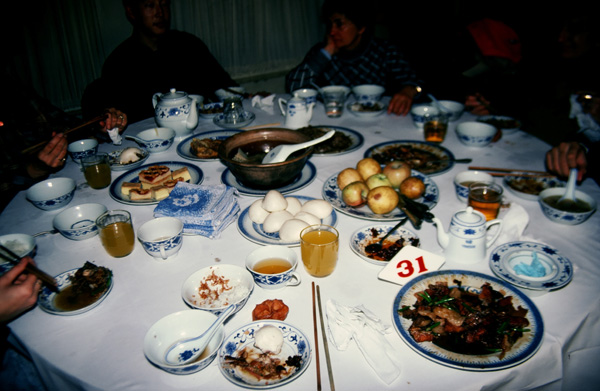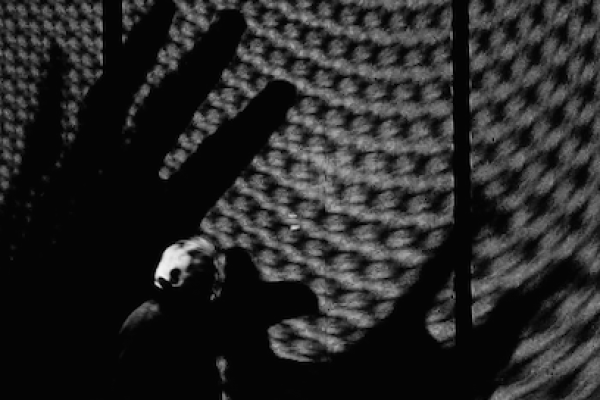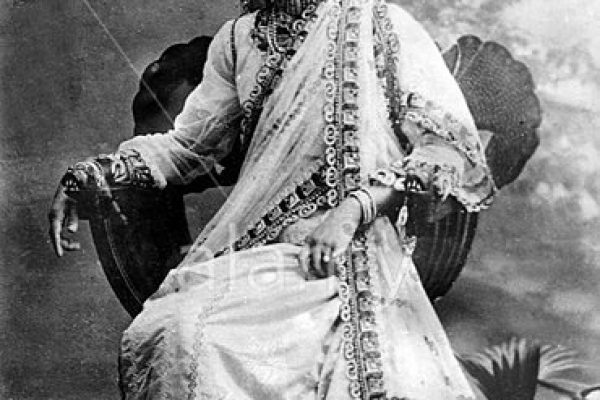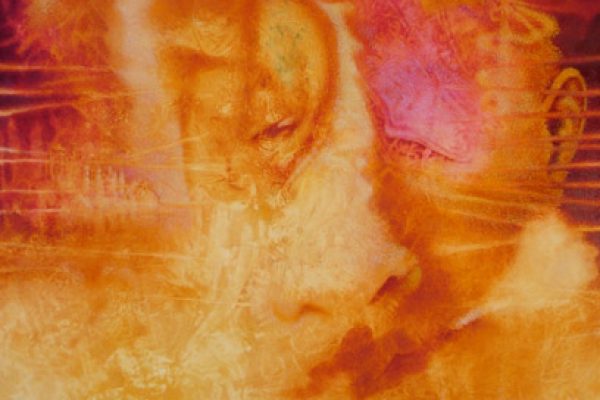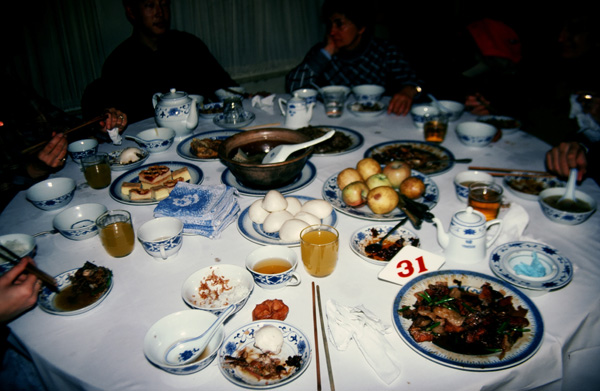
I met Patrick through a mutual friend who knew we were both reading Oracle Bones, Peter Hessler’s journey into the origins of Chinese writing. Patrick, who used an English name for the benefit of his foreign friends, had studied Chinese literature at Beijing University and skipped grad school to work for his uncle’s private tutoring business. When we first met, at a café near the entrance to Tsinghua University, he took out a copy of an English textbook he sometimes used in class. “Look at this,” he said with a hint of suspicion, pointing to “Measure Words for Uncountable Nouns.” A teaspoon of cinnamon; a lump of coal. Then he read the list of words naming groups of animals, his voice more notably impatient: a pride of lions, a murder of crows, a wake of buzzards, a quiver of cobras, a bevy of deer, a gang of elk, a knot of frogs, a swarm of gnats, a plague of insects, a romp of otters, an exultation of skylarks. English, he felt, had gone off the rails.
As a teacher, he was used to explaining Chinese numeral classifiers to English speakers: ba for knives, chairs, and umbrellas; ben for book-like objects; chang for performances and rainfall; tiao for fish, rivers, and trousers; zhi for chickens and shoes. It was all very straightforward. “But how about Whitman,” he said, thinking of Hessler’s final chapter, which features a Chinese translation of “Out of the Cradle Endlessly Rocking.” Patrick had just read “Song of Myself,” and now wondered aloud at the following passage:
Swiftly arose and spread around me the peace andknowledge that pass all the arguments of the earth,
And I know the hand of God is the promise of my own,
And I know the spirit of God is the brother of my own,
And that all men born are also my brothers, and the women my sisters and lovers,
And that a kelson of the creation is love,
And limitless are leaves stiff and drooping in the fields,
And brown ants in the little wells beneath them,
And mossy scabs of the worm fence, heap’d stones, elder, mullein and poke-weed.
He needed to look up kelson, a nineteenth-century term for the bar of wood at the bottom of a boat that connects the floor timbers to the keel. But “a kelson of the creation is love”—what to make of Whitman’s choice of definite and indefinite articles? We drank more coffee and discussed the mischievous properties of English metaphor. He asked me to join his friends once a week to talk about poetry in translation.
• • •
We were teachers, students, freelance writers, and a documentary filmmaker. We usually met on Wednesday nights. At first it resembled a language exchange, that vague arrangement meant to justify any cultural transaction. A mix of Americans, Brits, and Chinese, we were on hiatus from graduate school, disenchanted with the system. Each of us was struggling to find a more authentic personal voice—one not too nationalistic, cynical, or saccharine. The Brits and Americans were mostly lost in a fog of irony. Our Chinese peers were caught between the English they picked up from Friends and the rigid chengyu of Maoist poems they had memorized in middle school. Group translation, we thought, would help us exorcise the parts of ourselves that felt most inauthentic.
A question we often discussed was whether language determines thought—a controversy on which amateur linguists love to speculate. Does British understatement prime the mind for skepticism? Does Chinese syntax limit one’s ability to ask hypothetical questions? My impression was that our main differences were cultural, not linguistic; half the fun was exposing just how arbitrary language could be. Still, when language is your primary tool for explaining what you think, the relationship you develop with it is necessarily intimate.
In China, large-scale shifts in language have been signs of momentous social change, a trend the journalist Evan Osnos describes in his book Age of Ambition. China today reminds him of America during the Gilded Age, an era of breakneck industrial growth with a corresponding shift in values. “Ambition” (in Chinese, ye xin, or “wild heart”) is one of many wordsthat have been affected by that shift. “In Chinese,” Osnos writes, “a wild heart had always carried the suggestion of savage abandon and absurd expectations—a toad who dreams of devouring a swan, as an old saying has it.” These days, however, the term carries a positive connotation. Fluency in English has become a common goal for ambitious youth. “Master English to Make China Strong!” one famous program’s slogan put it; the language is still considered a ticket to brand name universities. Of course, language is more than just a vehicle for knowledge. It is also a spiritual medium. Osnos compares the religious revival of twenty-first century China to the Great Awakening in nineteenth-century America. It is not an outrageous comparison. When I recommended Mark Twain to one of Patrick’s friends—I thought for sure he would relish a satire of America’s grandiose self-image—he said he couldn’t get beyond the harsh treatment of Christians.
• • •
Before I moved to Beijing, I had been a graduate student in Chicago. I left when I realized I couldn’t stand the voice of my academic essays. In China, I looked for models of expression elsewhere, mostly to visual art and film. In the work of director Jia Zhangke I discovered groups unmoored from tradition, community, or home. Xiao Wu (1997) portrays the fate of a pickpocket made obsolete by new crimes; Platform (2000) follows a troupe of performers threatened by mass entertainment; The World (2004) studies the lives of workers at a sad, Disney-style theme park on the outskirts of Beijing. The films are slow; the camera lingers as if to discourage the rush of time. I suppose they appealed to my sense of displacement. They also made me wish I had had more training in non-verbal art forms. The wide-angle shot struck me as more universal than the nuances of this or that adjective, tied to this or that language. So much of literature is lost in translation; a genuinely global perspective—despite the rhetoric of university seminars—is rare.
Does British understatement prime the mind for skepticism? Does Chinese syntax limit one’s ability to ask hypothetical questions?
I started reading accounts of authors who abandoned literature in disgust. After Rimbaud gave up poetry, he roamed the world in search of another calling: metallurgy, navigation, hydraulics, carpentry. Beckett was so disgusted with English he switched to French, and then realized he could use fewer words by writing plays instead of novels. Through friends, I discovered Chinese authors who shared this feeling of nausea. Xi Chuan, an English major who lived through China’s “Reform and Opening” phase, wrote almost nothing for two years following the massacre in Tiananmen Square. Then, beginning in the 1990s, he adopted a radically different style. One of the poems the group read together was “Exercises in Thought”:
Thought is like flying, and flying gives you vertigo, which is why I don’t always want to be in thought. Thought is like a bad habit, and bad habits offer you the full flavor of life, which is why I sometimes want to be in thought.
In Chicago, I worried about using language in a way that was basically thoughtless. Academic jargon, late-night satire, political sloganeering—each was limiting in its own way. This wasn’t just an intellectual or academic concern. In the Catholic tradition I grew up in, language is considered a gift from God, which is why Jesuits tend to obsess over problems of translation. When Matteo Ricci traveled to China in 1582, he tried to convert the imperial court by teaching them a mnemonic device derived from theological training. Meanwhile, he learned Chinese by assigning a story to each ideograph. The language, he saw, was rich enough to create a parallel universe. By the time I’d gotten to China, I still believed in this parallel universe, but I didn’t care to convert anyone.
• • •
One night, after teaching a class at the China University of Geosciences—Business Writing for future employees of the state-run oil company—I bought a copy of Bertrand Russell’s essays from a street vendor. I found myself easily persuaded by his argument in “‘Useless’ Knowledge”:
What is needed is not this or that specific piece of information, but such knowledge as inspires a conception of the ends of human life as a whole: art and history, acquaintance with the lives of heroic individuals, and some understanding of the strangely accidental and ephemeral position of man in the cosmos—all this touched with an emotion of pride in that which is distinctively human, the power to see and to know, to feel magnanimously and to think with understanding. It is from large perceptions combined with impersonal emotion that wisdom most readily springs.
Pride in that which is distinctively human—language, I thought, is distinctively human. Russell thought so too, but he was haunted enough by the vagueness of speech to translate ordinary sentences into the logical precision of predicate calculus. He also shared Patrick’s anxiety over definite articles: the Russellian analysis of the semantics of “the” is still the one freshman philosophy students meet in a first course on logic.
When I shared these discoveries with the group, I learned that Russell has quite a reputation in China. In 1920, he traveled to Beijing to lecture on formal logic, which challenged the Hegelian concept of spirit and resonated with the scientific fervor of the moment. Around the same time, Chinese writers were calling for large-scale language reform. Hu Shi argued for a literary style that combined the language of elite officials with that of the common people. Lu Xun satirized the empty rhetoric of “virtue and benevolence.” The historian Vera Schwarcz, although she refers to this period as the “Chinese Enlightenment,” notes that it was different from the one that took place in Europe. Whereas Europe experienced “disenchantment” as scientific law replaced religious superstition, China, Schwarcz argues, experienced “disengagement”: what dissolved were bonds of duty, not transcendental belief.
Still, both China and Europe witnessed a shift toward the vernacular. Modern Chinese combines classical text and plain talk, with imports from Japanese and European languages. Of course, American English is a mongrel tongue as well, and has its own history of standardization. Noah Webster, the American philologist and lexicographer, believed strongly in declarations of linguistic independence, praising the vernacular as a vehicle of democracy—he had no time for foreign prestige or false eloquence. And yet he felt a strong compulsion to codify natural speech patterns and dictate spelling rules. He spent the bulk of his career propagating his own brand of English.
• • •
Words are infinitely cunning. “They are the wildest, freest, most irresponsible, most unteachable things,” Virginia Woolf wrote. “Of course, you can catch them and sort them and place them in alphabetical order in dictionaries. But words do not live in dictionaries; they live in the mind.” Once, while listening to a woman named Pei discuss a poem by Bei Dao,I recalled the display of Chinese characters during the Opening Ceremony of the 2008 Olympics: drummers and acrobats harmonized to express the idea of a living script. In one sense, the performance was a gorgeous, noisy response to Hegel, who claimed that ideographs could never compete with the virtues of an alphabet. Here, at last, was the sacred medium of a thriving civilization-state, broadcast live around the world. But language in its vernacular form resists such choreography. Dante’s Italian, Shakespeare’s English, China’s countless dialects—each has a clear pedestrian quality.
In China, large-scale shifts in language have been signs of momentous social change.
The pedestrian found its calling at the beginning of the twentieth century. A year before the Russian Revolution, Velimir Khlebnikov, a Futurist poet, told his friends he was working on an “alphabet of the mind”—a universal language based on folk etymology. The problem was, he only included linguistic units of Slavic speech. Ernest Fenollosa, an art historian and friend of Ezra Pound, was, like Khlebnikov, concerned that his language (English) had become a stuffed corpse. For him, Chinese was more exciting; the ideograms, he wrote, symbolized “verbal ideas in action.” Stripped of all unnecessary elements—useless particles, ungainly gerunds, and arbitrary prepositions—Chinese brought him closer to things. (“No ideas but in things,” William Carlos Williams would write.) The English language, he felt, was drifting further into abstraction—from “bright” to “luminous” to “luminosity,” we cannot resist nounification. Chinese, in contrast, throws light on our “forgotten mental processes,” and affords us a glimpse into the raw material of our cognition.
A similar insight is common to books on “New China Newspeak,” the accepted language of the Communist Party and widespread object of parody and scorn. Perry Link, in The Anatomy of Chinese, suggests that one of its virtues is the general intolerance of irritating abstractions: “positionality,” “postmodernism,” and “on a daily basis” are given as examples of intellectual “affectations.” Some of Link’s conclusions appeal only to the scholarly lobe; he claims, for instance, that the Western mind-body problem is “less problematic in Chinese.” His main point, though, is that language is not just a field of study. It is the raw material of political power as much as it is a representation of cognitive processes. Ian Buruma, a journalist who has written widely about East Asia, adopts a similar vigilance in his own political reporting. Bad Elements, his clear-eyed book on exiled Chinese dissidents, traces the rhetorical shift from the 1989 protests through the economic boom of the 1990s—in a word, from blood sacrifice to business speak. Osnos sees a similar story in the post-boom years. Having abandoned socialist economics, and faced with a savvier population, the Party decided to retool its propaganda mechanism. For inspiration, it studied the rise of public relations in the United States, especially the government’s influence over the mainstream media in the lead-up to the Iraq War. This was seen as a great success, worthy of emulation.
• • •
I often thought of our reading group as an antidote to propaganda. Not just state propaganda, which was easy enough to satirize, but also the kind that makes its way into people’s everyday speech. Good poetry breaks the chemical bonds of cliché, after all. Rae Armontraut, a group favorite, is especially good at rearranging the molecules:
How much present tensecan any resemblance make?What if one catch-phraseappears in every episode?Does the language go rigid?
The new in-joke
is a pun
pretending to be a bridge.
Reading poetry challenged our worst affectations: cheap ideology, fraudulent insights, secondhand convictions. We had found a language that had not gone rigid.
The group only lasted about a year. Most members went back to graduate school or continued to work as freelance writers. Others went on to law school or applied to government jobs. Still, at least for a while, we had found a cure for the doublespeak, jargon, and Politburo guanhua that governed our daily communications. The cure was being in thought, and literature, for us, meant being in thought with others.
Photograph: Terry Feuerborn
